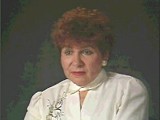<< Previous | Displaying results 2101-2110 of 6719 for "" | Next >>
-
David (Dudi) Bergman describes bar mitzvah during deportation by cattle train from Auschwitz to Plaszow
Oral HistoryThe Germans occupied David's town, previously annexed by Hungary, in 1944. David was deported to Auschwitz and, with his father, transported to Plaszow. David was sent to the Gross-Rosen camp and to Reichenbach. He was then among three of 150 in a cattle car who survived transportation to Dachau. He was liberated after a death march from Innsbruck toward the front line of combat between US and German troops.

-
Murray Pantirer describes one of Oskar Schindler's rescue efforts
Oral HistoryThe Germans occupied Krakow in 1939. Murray's family was confined to the Krakow ghetto along with the rest of the Jewish population of the city. In 1942, Murray and a brother were deported for forced labor in the nearby Plaszow camp. In May 1944, his brother was transferred to Auschwitz and Murray was sent to the Gross-Rosen camp in Germany. Murray was later transferred to Bruennlitz, in the Sudetenland, as a forced laborer for German industrialist Oskar Schindler. Schindler helped the Jews who worked for…
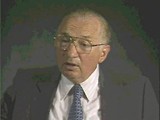
-
Murray Pantirer describes the "Schindler Jews" in the Bruennlitz factory
Oral HistoryThe Germans occupied Krakow in 1939. Murray's family was confined to the Krakow ghetto along with the rest of the Jewish population of the city. In 1942, Murray and a brother were deported for forced labor in the nearby Plaszow camp. In May 1944, his brother was transferred to Auschwitz and Murray was sent to the Gross-Rosen camp in Germany. Murray was later transferred to Bruennlitz, in the Sudetenland, as a forced laborer for German industrialist Oskar Schindler. Schindler helped the Jews who worked for…
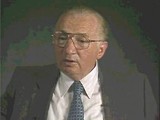
-
Felix Horn describes escaping from the Majdan Tatarski ghetto and seeking shelter
Oral HistoryFelix was born to an assimilated Jewish family in Lublin, Poland. His father was a locksmith and his mother was a singer. Following the German invasion of Poland on September 1, 1939, Felix fled east to Rovno and then to Soviet-occupied Lvov, where he was accepted at a medical school. After the German invasion of the Soviet Union in June 1941, Felix was taken to a labor camp. He escaped and returned to Lublin, and found that his family had been forced into the ghetto established there. After the…
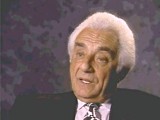
-
Helen Dreksler Zimm describes obtaining a false birth certificate
Oral HistoryHelen was the oldest of three sisters. Her father owned a soap factory. After the Germans attacked Poland in 1939, they took over all Jewish businesses. Helen and her family fled from Lodz to a town between Lodz and Warsaw. After two years, in 1942, Helen's father heard that the Jews in the town to which they had fled were to be deported to labor camps. He bought false papers for Helen and her youngest sister. All three sisters survived the war.
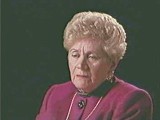
-
Lucine Horn describes her escape from the Majdan Tatarski ghetto
Oral HistoryLucine was born to a Jewish family in Lublin. Her father was a court interpreter and her mother was a dentist. War began with the German invasion of Poland on September 1, 1939. Lucine's home was raided by German forces shortly thereafter. Soon after the German occupation of Lublin, Jews there were forced to wear a compulsory badge identifying them as Jews. A ghetto in Lublin was closed off in January 1942. Lucine survived a series of killing campaigns and deportations from the ghetto during March and…
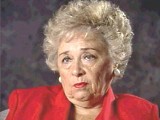
-
Liny Pajgin Yollick describes fleeing to France from Antwerp
Oral HistoryIn May 1940, the Germans occupied the Netherlands. In 1942, it took Liny, her mother, and her sister six months to escape to southern France. They pretended to be Protestant, obtained visas to travel through Spain and Portugal, and were on one of the last trains to cross into Spain after the Germans took over southern France. They boarded a Portuguese ship bound for Dutch Guiana (Suriname). Liny was placed in a refugee camp, and then worked in the Dutch embassy in Washington D.C. She eventually settled in…
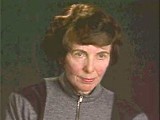
-
Aron (Dereczynski) Derman describes escape from a train during deportation from Grodno in 1943
Oral HistoryAron was born to a middle-class Jewish family in Slonim, a part of Poland between the two world wars. His parents owned a clothing store. After studying in a technical school, Aron worked as a motion-picture projectionist in a small town near Slonim. The Soviet army took over Slonim in September 1939. War broke out between Germany and the Soviet Union in June 1941. Aron returned to Slonim. The Germans soon occupied Slonim, and later forced the Jews into a ghetto. Aron was forced to work in an armaments…
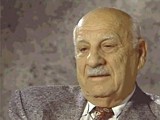
-
Felix Horn describes attempt to flee from the Majdan Tatarski ghetto
Oral HistoryFelix was born to an assimilated Jewish family in Lublin, Poland. His father was a locksmith and his mother was a singer. Following the German invasion of Poland on September 1, 1939, Felix fled east to Rovno and then to Soviet-occupied Lvov, where he was accepted at a medical school. After the German invasion of the Soviet Union in June 1941, Felix was taken to a labor camp. He escaped and returned to Lublin, and found that his family had been forced into the ghetto established there. After the…
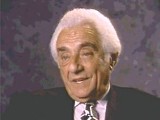
-
Frima L. describes escape from mobile killing unit massacre
Oral HistoryWhile Frima's family was confined to a ghetto, Nazis used her father as an interpreter. He later perished. By pretending not to be Jews, Frima, her mother, and sister escaped a German mobile killing unit massacre. They were later discovered and jailed. Again, her mother devised an escape. Frima's mother and sister were smuggled to Romania, while Frima wandered in search of safekeeping until her mother could arrange to smuggle her out. In Romania, they were reunited and liberated.
